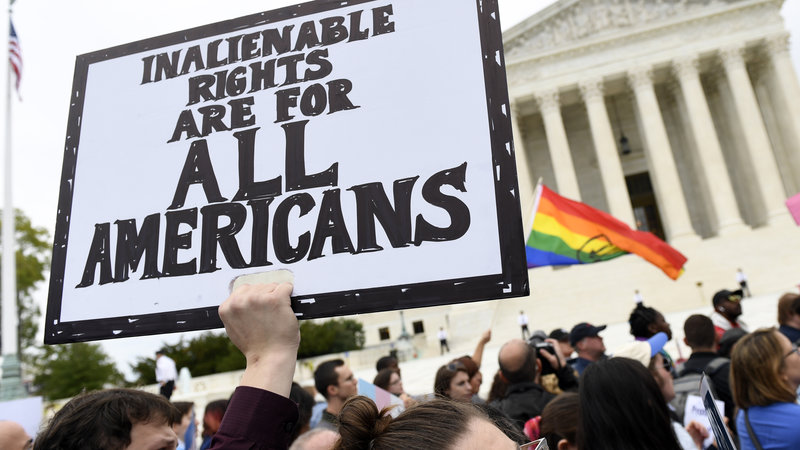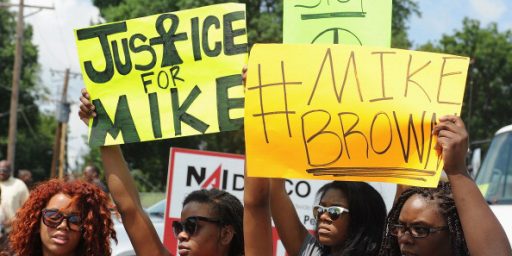Queer Couples, Divorce, and Custody Rights
An ugly divorce exposes a gap in our legal structure.

Via memeorandum, I see that an activist site called the 19th reports, “A lesbian mom raised her son for two years. An Oklahoma judge erased that in 15 minutes.”
For the first two years of her son’s life, Kris Williams read him the book “Love You Forever” before bedtime most nights. She took him to the park every Saturday.
In the middle of the pandemic, Williams cut out the cardboard babies on the front of diaper boxes and set them around the house — imaginary friends for W. when he couldn’t safely socialize. (The 19th has used only his first initial to protect his privacy.)[*}
Two years after their son’s birth, Williams and her wife, Rebekah Wilson, had started to split.
The split was nasty, Williams said, but she wasn’t prepped for the news she would receive at the couple’s divorce hearing in Oklahoma City last January.
Williams and Wilson are legally married and decided to have W. together, according to Williams, with Wilson carrying the baby. But within 15 minutes of the hearing starting, Oklahoma County District Court Judge Lynne McGuire declared that because Williams had not adopted her son, she was not his legal parent. Williams was ordered struck from W.’s birth certificate. In her place would go the couple’s sperm donor, who was now petitioning for custody.
“My body instantly started shaking,” Williams said. “I mean pure terror, as a queer person, to be erased.”
This is indeed heartwrenching and outrageous—although it turns out there’s more to the story, which we’ll get to. Rather obviously, Williams should have adopted the child, of whom she is not the biological mother. But it would have seemed reasonable for her to have believed that, since her name was on the birth certificate, she was legally recognized as a co-parent.
Williams has filed a motion to reconsider her case that is set to be heard on June 1. If the case makes its way to the appellate court, the ACLU of Oklahoma plans to step in, said ACLU attorney Hanna Roberts. Wilson and her lawyer declined multiple requests for an interview.
Williams’ case represents a nightmare scenario for many LGBTQ+ parents, who still lack the same rights granted to their heterosexual peers through marriage.
“The concern is if Kris loses, that’s going to set some pretty bad precedent in the state of Oklahoma, and possibly beyond,” Roberts said. “I think that this is just the first time that there has been such an adverse ruling that is so contrary to equal protection. It’s gotten the attention because same sex-couples get divorced all the time.”
So, while it’s true that heterosexual couples routinely divorce, the obvious comparison group is those who gave birth through surrogacy wherein only one of the two is biologically related to the child. That’s a relatively rare situation.
According to Williams, the couple found Harlan Vaughn on a paternity website together, and the three agreed that he would be involved at a distance. W. was born August 8, 2019. They named him after Williams’ uncle, she said.
When the couple separated, Williams said that Vaughn moved to Oklahoma City, where he and Wilson — W. in tow — moved in together. Williams said the last time she saw W. was in November after she and Wilson failed to come to an agreement about how to split up the holidays. Vaughn did not respond to requests for comment.
Given that I was heretofore unaware of the 19th’s existence and that it proclaims itself as being on a mission to “empower those we serve — particularly women, women of color and the LGBTQ+ community,” I searched for reports on this on more mainstream sites without success. The only source I’d heard of reporting on this was Newsweek, and it’s basically a re-reporting of the 19th’s piece. But an undated story from a local LGBTQ-friendly magazine from when the couple were still happy indicates that Vaughn was more than “involved at a distance.” He was an active part of W’s life from the beginning and his mother was involved as well.
Here’s the kicker:
The divorce has been ugly. Wilson was granted an emergency victim protective order on December 2. In the order, she alleges that Williams physically attacked her. Williams denies this. In January, Williams’ name was taken off of the birth certificate. The judge did not cite allegations of abuse in the decision.
Disputed claims of abuse are, sadly, not uncommon in divorce and custody battles. That it’s not mentioned in the decision (to which I don’t have access) is interesting.
Though parental laws vary from state-to-state, legal experts say Williams’ battle to maintain custody of her son could be a test case for Oklahoma and the nation seven years after the Supreme Court granted marriage equality nationwide.
After 2015, when marriage equality was granted federally, queer legal groups battled a series of cases to enshrine marriage rights for LGBTQ+ couples. That included parental rights through marriage. In 2015, two non-gestational parents — those who did not give birth — in Arkansas were not listed on their children’s birth certificates. Their case, Pavan v. Smith, went all the way to the Supreme Court, where the court ruled that states could not treat queer couples differently than heterosexual ones. If straight couples who conceived together in a marriage were presumed to be parents of that child, queer parents must be afforded that same right, the ruling said.
Karen Loewy, senior counsel at Lambda Legal, notes that decision had a profound impact on marriage and parental rights.
“The courts pretty uniformly have found the presumption to apply, have limited the ability of birth moms to try and rebut the presumption of parentage for their same-sex spouse who they’re in the midst of divorcing, and have recognized that children born to married same-sex couples have two parents in both of the spouses,” Loewy said.
Pavan v Smith was issued in June 2017 per curiam. The circumstances were similar but not identical to this case: lesbian couples who had given birth through an anonymous sperm donor. Just-confirmed Justice Gorsuch dissented and was joined by Justices Alito and Thomas. Their rationale was technical and didn’t turn on the issue of same-sex marriage at all but whether a state may privilege biological parents on a birth certificate and whether “the strong medicine of summary judgment” was warranted given the unsettled nature of this question. Since then, Justice Kennedy retired and Justice Ginsburg died, being replaced by Justices Kavanaugh and Barrett, respectively. It is entirely conceivable, therefore, that the precedent is on shaky ground.
Loewy said it is unclear in Oklahoma if being listed as a parent on a birth certificate grants parentage. Laws state-to-state regarding birth certificates are idiosyncratic, and while courts have generally granted parental rights to spouses regardless of biological connections, there have been exceptions.
Wilson has posted repeatedly about the case on Facebook. In text and video updates, Wilson alleges that Williams abused her during their marriage, which Williams disputes. She acknowledges that she “spoke ugly” towards the end of their relationship.
“We all have our moments, but to say I’m abusive…” Williams trailed off.
In her social media posts, Wilson says she is not motivated by a desire to undermine LGBTQ+ parental rights. Instead, she says her goal is to protect W. from perceived harm, using the tools available to her. (Wilson does not allege online or in the protective order paperwork that Williams harmed W. directly.)
“I will use any legal strategy I need to use, unapologetically,” she wrote on March 9.
I have no insight as to the degree the relationship grew abusive but, again, it doesn’t appear to have factored into the judge’s decision. Even if it were, the courts don’t typically (ever?) strip the presumption of parentage as part of divorce proceedings, even in cases where a parent is ruled unfit to have visitation rights. But, again, I just don’t know what the case law is with regard to cases where one parent is the biological and the other is admittedly not.
Nancy Polikoff is professor emerita at American University College of Law and an expert in LGBTQ+ family law. She says queer legal experts, fearing cases like Williams’, have warned clients to get confirmatory adoptions while case law in states catches up to federal marriage rights.
“Nobody wants to do it because it costs money and because it’s offensive to have to adopt your own child, but it is the guarantee that that parent-child relationship can be recognized anywhere, even if you move to the most homophobic possible state,” Polikoff said.
But the problem is that, whatever the emotional bond is, the biological parent is naturally going to be presumed to have greater rights to custody at separation. Adoption changes that presumption.
Regardless of whether the couple is same- or opposite-sex, it would be nice to live in a world where the couple wasn’t vindictive toward one another, let alone using the custody of the children as a weapon, in divorce proceedings. Or where lone judges and their personal quirks didn’t factor so heavily into such life-altering decisions. Alas, that’s not the world we live in.
____________________
*To avoid rerailing the post, I’ve reserved my observation that using the child’s first initial while providing the names of all four adults involved in the case does zero to protect his privacy for this footnote. This is even more true here, in that both women in the relationship have been outspoken LGBTQ activists and are thus easily findable with a simply Google search.






One of the saddest things I have noticed in the decades that I’ve spent herding lawyers is just how fracking ugly adults can be. In their pain and desire to hurt each other, they forget that the goal isn’t (or shouldn’t be) to hurt each other, but the best interests of their children. I’ve seen this too many times, and it’s a major reason why I had to get out of family law.
Ummmm, no. It is always possible to know who the biological mother of a child is, not so much the father. Short of a DNA test some, like an old buddy of mine, will always wonder. At least until he had one of his son’s baby teeth tested. (B has issues, mental/emotional. I never understood why he did it, and even less could I understand why he told the child he had raised and loved for 2 decades that he wasn’t in fact B’s son). My sons are obviously mine, the genetic heritage is too obvious.
Regardless, the husband is presumed to be the parent based on nothing more than a marriage certificate. I see no reason it should not be the same with same sex marriage.
Something tells me that is because if they did, the biological abusive father would no longer be responsible for child support, but IANAL so could certainly be wrong.
My sons ex’s lawyer engaged in some abusive tactical legal filings for… reasons, but the judge invariably threw all that stuff out at the first hearing of such motions. Fortunately, that is all water long ago flowed downstream and my son and his ex have a good and supportive relationship for their daughter.
Wish I could say the same for me and my ex, but there are things she did to my sons that I can not forgive, even if they have.
There is no gap. This case is explicitly addressed in Oklahoma state law: children born in a marriage are presumed to be the children of both parties.
Oklahoma Statutes §10-7700-204:
A judge blatantly refusing to apply the law because they have personal animus toward LGBT people is not a “gap” in the law no matter how much people like Dr. Joyner want to whitewash it.
@Stormy Dragon: But the statute applies to men, for reasons @OzarkHillbilly artiulates. The law hasn’t been updated to include same-sex couples, one of whom is the biological parent and the other by definition cannot be.
Absent actual evidence in support of this, that’s pure conjecture. I haven’t read the ruling and have no idea how he rules on contentious cases involving surrogate births among opposite-sex couples.
Dr. Joyner,
Do you ever lose sleep over whether a state is going to forcibly dissolve your marriage against you and your spouses wishes?
Do you ever lose sleep over whether a state is going take your children away, not because of what you do, but because of who you are.
Do you ever have that nightmare when your partner dies unexpectedly and then your in laws sue to take your kids away because they don’t “approve of your lifestyle”.
I have those three constantly. What you are suggesting in your commentary is that non-heterosexual marriages are some how less than or other. That they way we build our families are nothing more than fun little sandcastles to imagine in while the heteros get down to the real work of raising proper families.
The presumptions of parentage of ka child born during a marriage are given out like candy and would never cast aside like this. This is animus pure and simple.
@Beth: As I see it, there are two gaps in the law:
– States treat same-sex relationships differently. That’s currently irrelevant because of Obergefell but we should enshrine in in Federal statute to ensure its permanence.
– We haven’t fully standardized parental status in the case of surrogacy when one of the parents is not biological. We should. Again, that’s something easily within Congress’ remit.
Surrogacy might not be all that common, but sperm donors are not. Lots of heterosexual couples wind up using a sperm donor, known or anonymous, to conceive their children. Do the husbands in such cases need to adopt their own children?
@Kathy: As @Stormy Dragon notes above, Oklahoma (and I gather most if not all states) presume a married man is the father of his wife’s child. But same-sex marriage is relatively new and the laws have not been updated. By definition, in a same-sex couple, at least one of the two is not a biological parent. So, we need to update the law to deal with this. I think it’s reasonable that, if a same-sex couple is married, that any child one of them adopts, has via invitro or surrogacy is both of theirs.
(As I understand it, even in opposite-sex cases, the rights of biological surrogates are much stronger than seems reasonable in much of the country.)
@James Joyner:
Federal courts have repeatedly established that we don’t because of Obgerfell, but anti-LGBT judges keep forcing us to do so anyways.
Again, this is not a gap in the law, it’s a deliberate choice to ignore the law, no matter how many bad-faith attempts moderates make to pretend it’s not.
@Beth:
Marriage is a legal framework. If same-sex marriage is dependent on the whims of judges who inject their own ignorance or bias, then it functionally is lesser than opposite sex marriage.
It’s a bad thing, but it’s very clearly the case.
The law that Stormy Dragon quotes above clearly says “man”. In light of Oberfell, I think it should be read as “spouse,” but… there’s wiggle room for a judge to inject their own interpretation, which then means LGBTetc folks have to appeal, and hope for a better judge.
There really is a gap in the laws, as the laws haven’t been updated post-Oberfell, and that gap is being filled by judicial rulings.
@Stormy Dragon points out that the Federal courts have been clear, and she isn’t wrong, but relying on the courts to fill the gaps leads to poor outcomes.
Referencing our hosts final quote:
I see this as a failure of the legislature to bring laws into compliance with the courts. The Democrats don’t want to bother because it’s a won issue (national Dems in this case, as Oklahoma Dems are irrelevant), and the Republicans don’t want to because they hope to roll the rights back.
Ultimately, very similar to Roe v Wade.
@Gustopher: Yes. The problem with judge-made laws, which are based on specific cases in controversy, is that there’s always a “What about this?” Legislation tends to cover all the bases at once.
I can’t tell easily whether this judge is a bigot, recalcitrant, or actually being reasonable. She appears to be some sort of really low-level judge that exists because the courts are overwhelmed. She didn’t even go to a real law school. But judges are going to judge, quite often badly. Laws are preferable.
@Flat Earth Luddite: Alas, as you know from conversations you had with my ex-wife, hurting the other spouse is sometimes (frequently?) the primary (only?) goal in seeking dissolution of a marriage. But yes, that’s certainly sad–particularly when children are reduced to the status of playing pieces in the game.
@James Joyner:
If Congresspersons were willing to do ANY of the things that are “easily within [their] remit…”
You know, I kind of agree that legislated laws are better. The founders knew, though, that sometimes the right thing, the fair thing, wasn’t going to be the popular or political thing, and that’s why we have courts.
And we now have a Court that is more than happy to gut laws (in particular the Voting Rights Act of 1965) that were passed “to enforce the 15th Amendment”. VRA passed the Senate with 77 votes in favor. Yes, we live in a world where our highest court has little respect for rule of law and precedent. They seem set to enshrine a religious belief – “life begins at conception” – as the law of the land. Instead of protecting the Establishment Clause, they are tearing it up.
In some sort of highly theoretical way, I kind of agree that written laws are better. However, as has been demonstrated time and time again over the last twenty years – rule of law can only be sustained if the politics sustain it. It is a mistake to speak of law as having more power than politics. That is not how the world works.